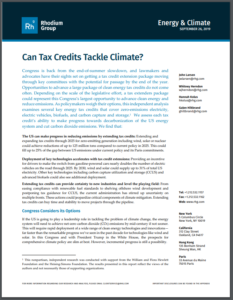Full Title: Can Tax Credits Tackle Climate?
Author(s): John Larsen, Whitney Herndon, Hannah Kolus, and Galen Hiltbrand
Publisher(s): Rhodium Group
Publication Date: September 26, 2019
Full Text: Download Resource
Description (excerpt):
Congress is back from the end-of-summer slowdown, and lawmakers and advocates have their sights set on getting a tax credit extension package moving through key committees with the potential for passage by the end of the year. Opportunities to advance a large package of clean energy tax credits do not come often. Depending on the scale of the legislative effort, a tax extenders package could represent this Congress’s largest opportunity to advance clean energy and reduce emissions. As policymakers weigh their options, this independent analysis examines several key energy tax credits that cover zero-emissions electricity, electric vehicles, biofuels, and carbon capture and storage.[1] We assess each tax credit’s ability to make progress towards decarbonization of the US energy system and cut carbon dioxide emissions. We find that:
The US can make progress in reducing emissions by extending tax credits: Extending and expanding tax credits through 2025 for zero-emitting generation including wind, solar or nuclear could achieve reductions of up to 125 million tons compared to current policy in 2025. This could fill up to 25% of the gap between US emissions under current policy and its Paris commitments.
Deployment of key technologies accelerates with tax credit extensions: Providing an incentive for drivers to make the switch from gasoline-powered cars nearly doubles the number of electric vehicles on the road through 2025. By 2030, wind and solar could supply up to 31% of total US electricity. Other key technologies including carbon capture utilization and storage (CCUS) and advanced biofuels could also see additional deployment.
Extending tax credits can provide certainty to new industries and level the playing field: From easing compliance with renewable fuel standards to shelving offshore wind development and postponing tax guidance for CCUS, the current administration has stirred up uncertainty on multiple fronts. These actions could jeopardize critical components of climate mitigation. Extending tax credits can buy time and stability to move projects through the pipeline.
